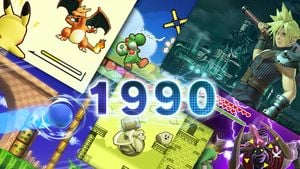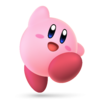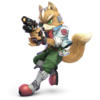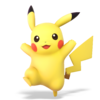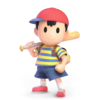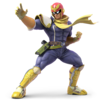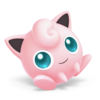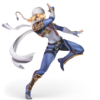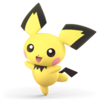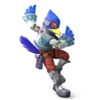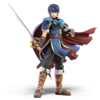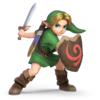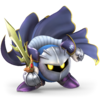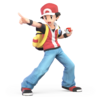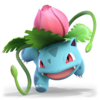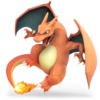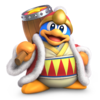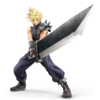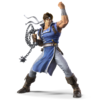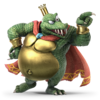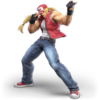Hailing from the '90s: Difference between revisions
From SmashWiki, the Super Smash Bros. wiki
Jump to navigationJump to search
m (Undid edit by 97.120.57.67: Other decade events don't mention yet-to-be-released DLC, one even removed a mention) Tag: Undo |
(→Trivia: WarioWare debuted in 2003, while Mario Land 2 was in 1992.) |
||
| Line 146: | Line 146: | ||
==Trivia== | ==Trivia== | ||
*The banner for the event pays homage to ''Pokemon Red and Blue'', ''Super Mario World 2: Yoshi's Island'', ''Final Fantasy VII'', ''Sonic the Hedgehog'', ''Kirby's Dream Land'' and ''The Legend of Zelda: Ocarina of Time''. | *The banner for the event pays homage to ''Pokemon Red and Blue'', ''Super Mario World 2: Yoshi's Island'', ''Final Fantasy VII'', ''Sonic the Hedgehog'', ''Kirby's Dream Land'' and ''The Legend of Zelda: Ocarina of Time''. | ||
*Character eligibility | *Character eligibility appears to be based on the Japanese release year of their base costume, not any alternate costumes. {{SSBU|Hero}} was not present despite [[Hero#Dragon Quest IV|Solo]] originating from the 1990s; the {{SSBU|Pokémon Trainer}} was present despite their female costume originating from the 2000s. | ||
**The exception to this is {{SSBU|Wario}}, whose base costume debuted in 2003, while his alternate overalls costume is the basis for his inclusion, having debuted in 1992. | |||
*[[Spiral Mountain]] is the only stage from a 1990s game not present in the event. | *[[Spiral Mountain]] is the only stage from a 1990s game not present in the event. | ||
**This could arguably also apply to [[Kongo Falls]], [[Castle Siege]], [[Coliseum]] and [[King of Fighters Stadium]], as while these stages are not based on specific games, the concepts originate from ''Donkey Kong Country'', ''Fire Emblem: Shadow Dragon and the Blade of Light'', and ''Fatal Fury: King of Fighters'' respectively, all of which were released in the 1990s. | **This could arguably also apply to [[Kongo Falls]], [[Castle Siege]], [[Coliseum]] and [[King of Fighters Stadium]], as while these stages are not based on specific games, the concepts originate from ''Donkey Kong Country'', ''Fire Emblem: Shadow Dragon and the Blade of Light'', and ''Fatal Fury: King of Fighters'' respectively, all of which were released in the 1990s. | ||
Revision as of 22:54, February 18, 2021
Hailing from the '90s (対決! 1990年代生まれ, Showdown! Born in the 1990s), known as Fighting in the Nineties in PAL regions, was an Event Tourney that ran from 6 a.m. on February 21, 2020 to 6 a.m. on February 24, 2020 (UTC). During the event, only characters and stages that originated from games released in Japan during the 1990s could be used.
Description
- This tourney features fighters and stages that were created in the '90s!
- The further you advance, the better the spirit you'll win![1]
Rules
- Format: Smash
- Rules: Time
- Time Limit: 2:30
- FS Meter: On
- Items: Medium
Available fighters
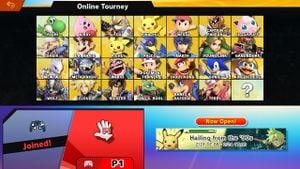
The character selection screen for Hailing from the '90s.
Available stages
Names in other languages
Trivia
- The banner for the event pays homage to Pokemon Red and Blue, Super Mario World 2: Yoshi's Island, Final Fantasy VII, Sonic the Hedgehog, Kirby's Dream Land and The Legend of Zelda: Ocarina of Time.
- Character eligibility appears to be based on the Japanese release year of their base costume, not any alternate costumes. Hero was not present despite Solo originating from the 1990s; the Pokémon Trainer was present despite their female costume originating from the 2000s.
- The exception to this is Wario, whose base costume debuted in 2003, while his alternate overalls costume is the basis for his inclusion, having debuted in 1992.
- Spiral Mountain is the only stage from a 1990s game not present in the event.
- This could arguably also apply to Kongo Falls, Castle Siege, Coliseum and King of Fighters Stadium, as while these stages are not based on specific games, the concepts originate from Donkey Kong Country, Fire Emblem: Shadow Dragon and the Blade of Light, and Fatal Fury: King of Fighters respectively, all of which were released in the 1990s.
- Mushroom Kingdom II is present in the event despite coming from a 1980s game (1987's Yume Kōjō: Doki Doki Panic in Japan and 1988's Super Mario Bros. 2 in North America), because Super Mario Bros. 2 itself (known as Super Mario USA in Japanese) first released in Japan in 1992.
- The European/Australian name may be a reference to Maurizio De Jorio's song "Running in the 90s".
- Final Destination is present in the event, but not Battlefield, despite both originating from the original Super Smash Bros.. This is likely due to Smash 64's variation of Battlefield having a different name, being known as Duel Zone.
References
